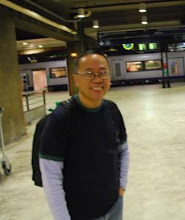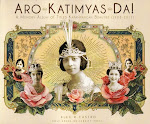 |
FATHER AND SON Edilberto and Ricardo, died in an 1946 ambush in Bacolor, allegedly committed
by the governor's body guards. The double murder remains unsolved, Photos: June TiglaoTuazon. |
Seventy seven years ago, one of the most horrifying
killings in Pampanga’s crime history happened in Bacolor, resulting in the deaths of members of one the town’s most prominent families: 62 year old EDILBERTO JOVEN and his
son RICARDO, age 24. Edilberto’s brother, FRANCISCO, 55, lived to
tell the tale of this brutal murder, that has remained unsolved to this day,
and that a cover-up was made to protect the masterminds.
The elder Joven, an Ateneo graduate, was a pharmaceutical
chemist by profession. His father was Francisco Casas Joven, brother of Ceferino
C. Joven, the first Civil Governor of Pampanga in 1901. In 1906, he married
Margarita Palma, who died in 1919 and left him with 5 children. That
same year, he was elected mayor of Bacolor, and was elected for a 2nd
term in 1922. By then, he had taken a second wife, Elena Samia, with
whom her had 4 children; Ricardo or Carding, a law student, was the eldest and only son from that union.
After his mayoral stint, he worked for the Bureau of
Internal Revenue as a drug inspector from 1924 to 1928. On the side, he joined
groups like Recreativa Filantrofica, Ding Aficionados Bacolod and
Ing Parnasung Capampangan for social and literary pursuits.
In 1931, Joven re-joined politics by becoming the Provincial
Board secretary, and 2 years later, during the term of Governor Pablo
Angeles-David, Joven was named Assistant Director of the Pampanga
Carnival of 1933 by the governor himself. His return to the political arena and
party loyalty shift could have caused his untimely death and that of his son Carding.
Joven has had a brush with violence before. In
1915, a seemingly-sick cousin, Angel
Joven, armed with a pocket knife, assaulted him while crossing the street,
inflicting serious bodily injuries.
But that fateful event in 1946 was different, as it was
deadlier, and many believed, to be politically motivated for it coincided with
the national elections. Joven, by 1945, was the President of the newly-formed Pampanga
Democratic Alliance, a leftist party that
counts the National Peasants Union of the Hukbalahap, the Committee of Labor
Organizations of the local Communist Party and the Filipino Blue Eagle
Guerrillas as members, threw their support behind incumbent Sergio Osmeña’s
presidential bid.
On the distaff side was Pablo Angeles David who
cast his lot on Senate Pres. Manuel Roxas of the Liberal Party. David
had the unfortunate experience of being kidnapped twice by the Hukbalahaps in
1944 and 1945, by HMB Commander Silvestre Liwanag or “Kumander Bie”,
that caused him so much suffering. Though he came back alive, the Japanese
Kempeitai, seized him, believing he was now working for the HMB. His arrest would
profoundly affect his wife Concepcion’s health, who died on Christmas
Eve, 1944. It is no wonder then that as acting post-war Pampanga governor, he took a hard stance against the
Hukbalahap/HMB, driving them to the mountains and the hinterlands though
intense pacification operations.
As the Police Report recounted that on 23 April 1946,
about 9:15 p.m., shots were heard coming from the direction of barrio Tinajero.
When officers responded to the scene, they saw a parked jeep behind the Bacolor
Elementary School. Searching further, they found the bodies of Edilberto,
his son Ricardo, and Francisco, sprawled on afield some 100
meters away from the jeep. Miraculously, Francisco was alive, but barely, and
he was rushed to the hospital where he was able to give a statement to the
authorities, led by a certain Sgt. Pineda and the Chief of Police.
In his account, Francisco said that “on their way home just a few paces
from the gate of Bacolor Elementary School, 3 masked men and armed with
Thompson asked them to turn back their jeep where they came from. They made
them walk about 100 yards into the rice fields where they were shot.” There
appeared to be no motive for the killing, as the police stated at that time—2
days after the shooting--and the assailants remained unidentified.
In October, 6 months after the killing, a certain Sgt.
Ricardo Ocampo, an investigator of the 11th Military Police Co.,
stationed in Lubao surfaced, with a signed affidavit attesting to his knowledge
of the crime and the perpetrators behind it. He identified the killers as
bodyguards of the present governor, Pablo Angeles David. In his
explosive revelation, he said that a day after the murder, he met with Eliong
and asked him about the murder case.
Eliong alleged to have boasted that together with Nanding,
and their companion bodyguards, carried out the plan, and that he shot the
father-and-son Jovens with the submachine gun that caused their instant deaths.
He shot the wounded Francisco again after noticing he was feigning his death.
He said he wanted to shoot all of them on their heads, but Nanding was
rushing to leave the scene, so Eliong was not able to do so.
A few days after, Ocampo said he met with Nanding
in San Fernando, who was en route to Manila. Ocampo confronted him about
the Joven killings, pretending to praise him for his actions. At this, Nanding
told him he already knew who Ocampo’s source was—the looselipped Eliong.
Nanding admitted the killing, then afterwards, exacted from Ocampo
the promise to keep secret their conversations.
At the military headquarters, Ocampo saw Nanding
again who approached him and advised him to tell the Gov. Angeles the source of
his version of the story so that the governor himself would know what to do
with Eliong.
After talking to the other bodyguards, Ocampo came
to discover and conclude that Eliong and Nanding wanted to take
credit for the Joven killings, that was allegedly ordered by the
governor himself. Thus, by eliminating the opposition, victory would be assured
for Roxas and Liberal Party candidates in Bacolor.
Sgt. Ocampo
also managed to trick Lt. Ildefonso Paredes, Detachment Commander of the
111th Military Police Co., into admitting his role in the plot, by
bragging about being far better than the commander, having solved the case by
himself.
To this, Lt. Paredes allegedly retorted: “You
don’t think that I know what happened? Do you believe my boys? I told you you
could rely on them.” As a proof of his connivance, Lt. Paredes said that he did
not go directly to the scene of the crime when summoned, but drove around
different barrios to give the bodyguards more time to escape.
Ocampo ended his narrative with a recommendation
to confiscate the Thompson guns of the Gov. Angeles, fire them, have the
shells examined by ballistic experts, and then compare them with the bullet
shells found at the murder scene. He is certain that the tests will prove that one
of the governor’s Thompsons was used in the commission of the crime.
Despite these damning revelations pointing to the direct
involvement of the governor, his bodyguards, and the collusion of the police, Sgt.
Ocampo’s affidavit seemed to have been conveniently ignored. The
investigation did not prosper, no arrests were ever made, and the double murder
of the Jovens of Bacolor remains a cold case to this day, leaving a Joven
descendant to observe: “When people in power are involved, expect a cover up.
Politics then, as now, has not changed.”
(MANY THANKS to June Joven Tiglao and Nona Joven
Lim, for the photos, materials and additional information).
Ninu't Ninu Qng Kapampangan, 1936






